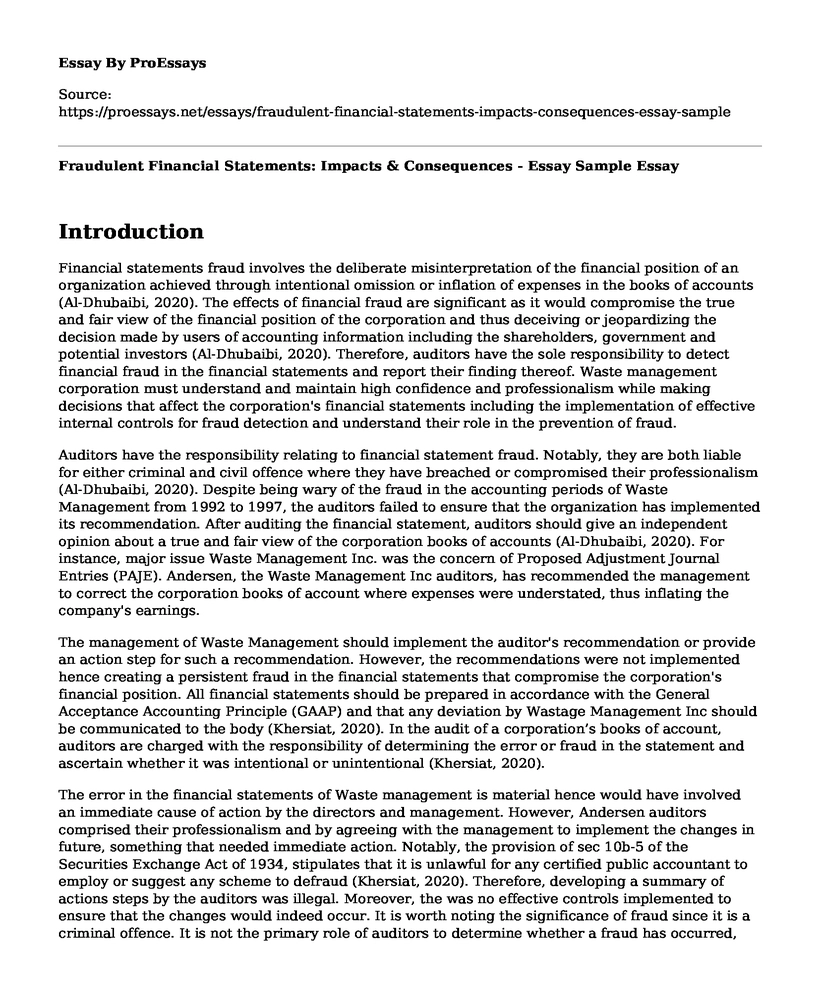Introduction
Financial statements fraud involves the deliberate misinterpretation of the financial position of an organization achieved through intentional omission or inflation of expenses in the books of accounts (Al-Dhubaibi, 2020). The effects of financial fraud are significant as it would compromise the true and fair view of the financial position of the corporation and thus deceiving or jeopardizing the decision made by users of accounting information including the shareholders, government and potential investors (Al-Dhubaibi, 2020). Therefore, auditors have the sole responsibility to detect financial fraud in the financial statements and report their finding thereof. Waste management corporation must understand and maintain high confidence and professionalism while making decisions that affect the corporation's financial statements including the implementation of effective internal controls for fraud detection and understand their role in the prevention of fraud.
Auditors have the responsibility relating to financial statement fraud. Notably, they are both liable for either criminal and civil offence where they have breached or compromised their professionalism (Al-Dhubaibi, 2020). Despite being wary of the fraud in the accounting periods of Waste Management from 1992 to 1997, the auditors failed to ensure that the organization has implemented its recommendation. After auditing the financial statement, auditors should give an independent opinion about a true and fair view of the corporation books of accounts (Al-Dhubaibi, 2020). For instance, major issue Waste Management Inc. was the concern of Proposed Adjustment Journal Entries (PAJE). Andersen, the Waste Management Inc auditors, has recommended the management to correct the corporation books of account where expenses were understated, thus inflating the company's earnings.
The management of Waste Management should implement the auditor's recommendation or provide an action step for such a recommendation. However, the recommendations were not implemented hence creating a persistent fraud in the financial statements that compromise the corporation's financial position. All financial statements should be prepared in accordance with the General Acceptance Accounting Principle (GAAP) and that any deviation by Wastage Management Inc should be communicated to the body (Khersiat, 2020). In the audit of a corporation’s books of account, auditors are charged with the responsibility of determining the error or fraud in the statement and ascertain whether it was intentional or unintentional (Khersiat, 2020).
The error in the financial statements of Waste management is material hence would have involved an immediate cause of action by the directors and management. However, Andersen auditors comprised their professionalism and by agreeing with the management to implement the changes in future, something that needed immediate action. Notably, the provision of sec 10b-5 of the Securities Exchange Act of 1934, stipulates that it is unlawful for any certified public accountant to employ or suggest any scheme to defraud (Khersiat, 2020). Therefore, developing a summary of actions steps by the auditors was illegal. Moreover, the was no effective controls implemented to ensure that the changes would indeed occur. It is worth noting the significance of fraud since it is a criminal offence. It is not the primary role of auditors to determine whether a fraud has occurred, however in so detecting they should communicate and provide recommendations with effective actions plan and controls (Kwok, 2017).
The detection of fraud rests with the country’s legal system and other bodies like the Security Exchange Commission (SEC). If the auditor the course of audit detect fraud, they should communicate to the concerned level of management, particularly those concerned with the prevention and detection of fraud (Kwok, 2017). Moreover, if the fraud in question involves the management, the auditors should communicate to those charged with governance. If the auditor doubts the integrity of those charged with governance, they should seek legal interventions for the next cause of action. These steps were not followed by Andersen auditors and those charged with governance of Waste Management; hence both are liable for a criminal offence for fraudulent activities.
References
Al-Dhubaibi, A. A. (2020). Auditors’ responsibility for fraud detection: Views of auditors, preparers, and users of financial statements in Saudi Arabia. Accounting, 279-290. https://doi.org/10.5267/j.ac.2020.2.007
Khersiat, O. M. (2020). The impact of joint audit on fraud detection in financial statements from the point of view of auditors. Research in World Economy, 11(1), 153. https://doi.org/10.5430/rwe.v11n1p153
Kwok, B. K. (2017). Accounting irregularities in financial statements. https://doi.org/10.4324/9781315263441
Cite this page
Fraudulent Financial Statements: Impacts & Consequences - Essay Sample. (2023, Aug 28). Retrieved from https://proessays.net/essays/fraudulent-financial-statements-impacts-consequences-essay-sample
If you are the original author of this essay and no longer wish to have it published on the ProEssays website, please click below to request its removal:
- Cost Behavior Analysis: Auburn Circular Club
- Impairment of Long-Lived Asset Investments - Essay Sample
- Essay Example on Valuing Bonds: Essential Components & Call Provisions
- Banks Embracing Technologies: Investment & Benefits - Essay Sample
- Essay on $800K Funding Secured: QueueDr Software to Reduce Cancellations in Q2 2020
- Convertible Stocks: Benefits for Investors & Companies - Essay Sample
- Head of Household Filing Status: Tax Advantages and Benefits - Essay Sample







